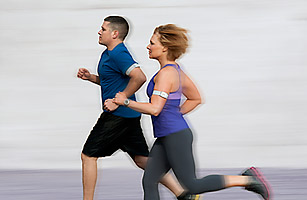
The BodyMedia Fit CORE armband
(2 of 2)
Today, the BodyMedia Fit has slimmed down to a third of its original size, less than an ounce in weight, and a cost of $180. "Fashion" armbands available in jewel-toned colors make the Fit look less like a medical device and more like a portable music player. The makeover has been a hit: Not only are online retailers like Amazon selling it, but so too are some big-box outlets like Costco, Target and Best Buy.
"We enthusiastically work with startups because they are at the cutting edge of identifying customer needs," says Best Buy Senior Vice President Neil McPhail. In order to make sure that unproven companies will be able to deliver product on time and of consistent quality, McPhail says, the chain actually reviews each company's financials and vets its suppliers and distributors. On Nov. 6, the retailer unveiled a new 1,200-sq.-ft. display space in three of its Chicago stores that showcases dozens of novel health technology products, including the BodyMedia Fit. Others products on display include the Zeo Sleep Manager, a $99 headband embedded with sensors that monitor your brain-wave activity while you sleep, then sends the results to your iPhone so you can view a detailed record of how much light, deep and REM sleep you got each night.
Proving It Works
Innovation breeds skepticism, however, and products like Zeo almost seem too good to be true. After all, until the first version of the Zeo headband went on sale in 2009, the only reliable way to measure one's sleep quality was by spending the night in a sleep lab. Meanwhile the growing cadre of so-called "activity monitors," which include Striiv, BodyMedia Fit, and a new $100 clip-on gadget called FitBit Ultra, have the opposite problem: They're easy to dismiss as little more than glorified pedometers.
One way to build people's confidence in such novel devices is to encourage satisfied users to post reviews online. Fitbit, whose original device went on sale in 2009, now boasts nearly 600 customer reviews and an enviable 4.5-star rating on Amazon.com. "We have very enthusiastic customers," says James Park, CEO of the company with some $11 million in venture funding.
Another route to building credibility is to win over the experts, who will then vouch for a product or even use it themselves. BodyMedia got doctors and scientists on board when it started selling its armband to researchers who were conducting studies for pharmaceutical trials and weight-loss studies. There are now some 150 published studies that validate the underlying technology, according to BodyMedia. "There is a robust body of evidence to show that they measure what they claim to measure," adds Stanford University anesthesiologist Larry Chu. The company even claims the device can help users lose up to three times more weight than they would without it.
Newer startups lacking such a cache of studies to validate their technology have wisely opted for a much softer sell. Withings, which sells a sleek $130 blood pressure cuff that syncs to an iPhone app to graph your daily readings, claims only that its cuff is within two points of accuracy, not that it will help you actually lower your blood pressure. Meanwhile Zeo claims that its brainwave monitor is 7/8ths as accurate as a full reading in a sleep lab, and explicitly states that the headband is not intended to diagnose medical problems. Meanwhile Striiv claims merely to "move people through positive reinforcement."
What remains to be seen, however, is whether such careful accounting of people's every move, day and night, is enough to get them moving more or if it will just make them feel more guilty that they're not.